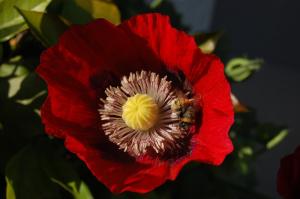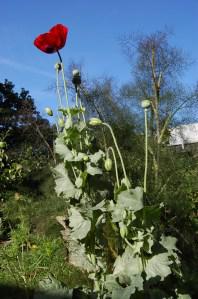
Papaver somniferum flower (03/06/2011, London)
Position: Will flourish in full sun to partial shade.
Soil: Moist and well drained.
Flowering period: Mid summer.
Eventual Height: 75cm
Eventual Spread: 30cm
Hardiness: N/A
Family: Papaveraceae
Papaver somniferum is an annual plant with an upright habit. Its foliage is oblong, lobed and light greyish-green. It has large, dioecious, single, terminal flowers that can be up to 10cm across. The inflorescence varies widely across the species including red, white, purple and pink.
P. somniferum also known as the Seed Poppy or the Opium Poppy, and has been cultivated for such a long time it is impossible to know its original native range. It is still widely cultivated today in a wide range of climates; from wet temperate climes such as England to much dryer and hotter ones such as those in the middle east. Grown both for its medicinal properties, as it is the primary source of highly useful drugs such as morphine and codeine, and its culinary uses; it is widely used in many bread and pastry recipes, particularly in the Czech Republic. In most temperate climates it is usually grown for its ornamental properties; within the species there is much variation in both colour and form of the inflorescence.
Papaver was the ancient Latin name of this plant , with somniferum being derived from the Latin somnus meaning ‘sleep’ and fero meaning ‘to bear’, referring to the narcotic properties of its latex.

Papaver somniferum (03/06/2011, London)
This plant may be useful to the landscape architect as an effective, fast growing and colourful annual. It will readily go to seed, therefore the removal of excessive seedlings in spring may be necessary.
This plant will tolerate most soil conditions; it will be happy in neutral or alkaline pH levels, or in loam, sand, clay or chalk based soils in a sheltered or exposed location facing any aspect.
Ecologically this plant will attract many pollinating insects such as butterflies and bees.
Maintenance: No maintenance required. The removal of excessive seedlings in spring may be necessary.

